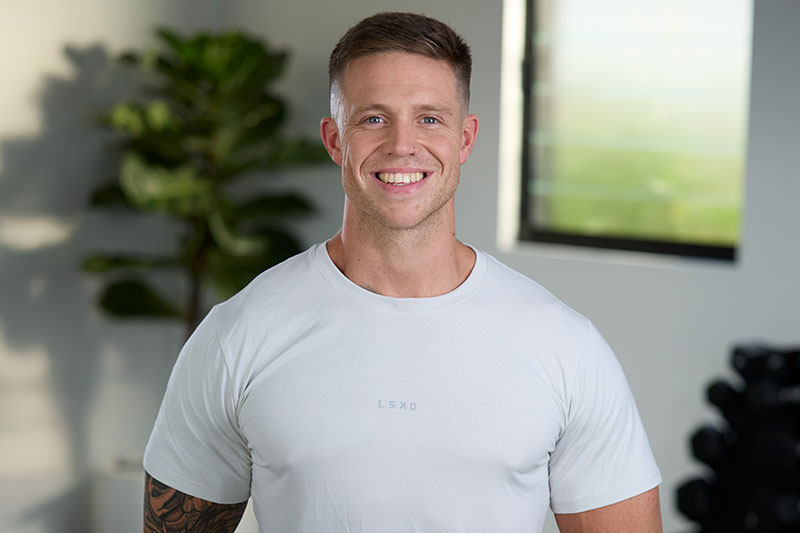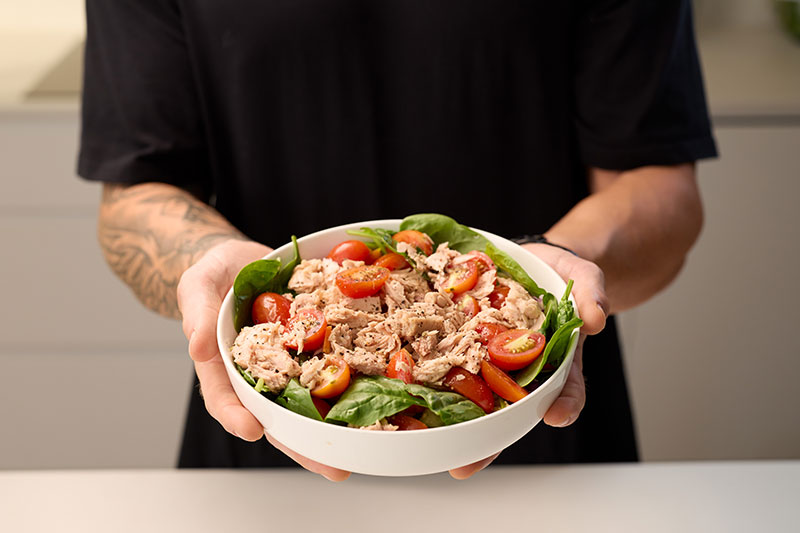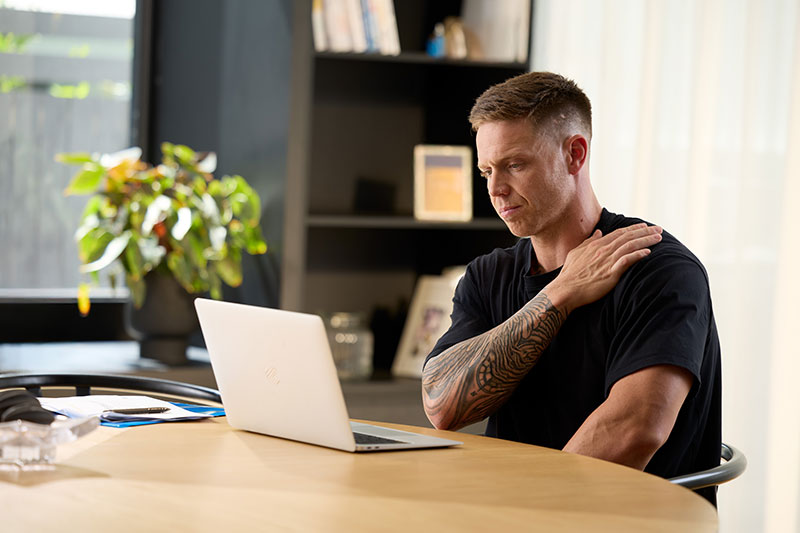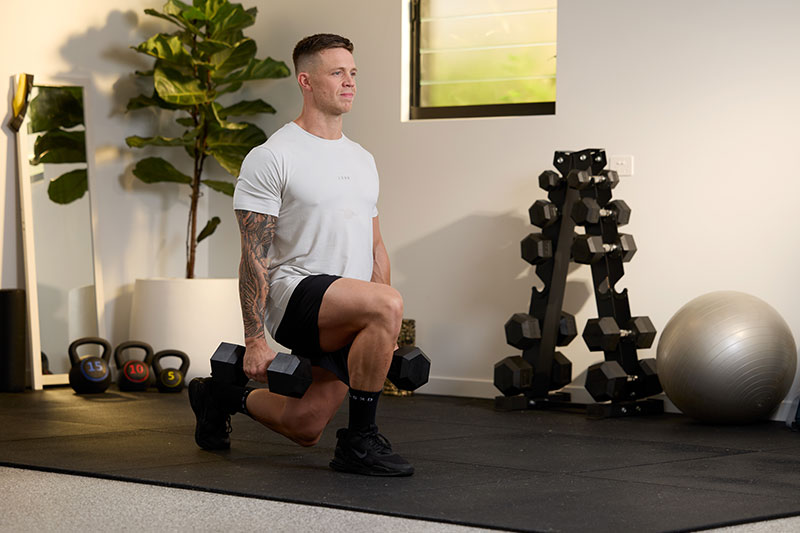8 August 2025
8 expert tips to improve your nutrition and fitness
Eating well and staying active are great for your physical and mental wellbeing.
But finding a healthy, long-term balance can be tricky, especially once you leave Defence.
Fortunately, there are lots of simple, research-backed ways to improve your food and exercise habits and mindset.
RSL Be:Well ambassador Aaron ‘Paz’ Parry
Here are some top tips from the free RSL Be:Well program and from veteran, personal trainer and Be:Well ambassador Aaron ‘Paz’ Parry.
1) Fuel your body right
“We have to understand that food is the fuel for our body,” Paz says. “So, if you want better performance, you need to fuel your body with better quality food.”
According to Paz, that means “good quality whole foods” (i.e. natural, minimally processed foods like fruit, veggies, wholegrains, nuts, eggs and lean meat) and “plenty of all the different macro and micronutrients like carbohydrates, fats and proteins”.
“It’s about not being afraid of a food group. They all have their place within our body,” he says.
“Carbohydrates help us with energy. Protein helps us with muscle development and repairing muscle if we're training in the gym. And fats have a big role in helping with our hormone health.”
Food does more than just nourish and energise you, however. You can actually boost your mood and reduce inflammation (which is linked to chronic pain – an ailment that’s common amongst the veteran community) by limiting your intake of saturated fat, cholesterol, salt and added sugar. Reach instead for foods like fresh fruit and veggies, fish, wholegrains, olive oil, almonds and natural yoghurt.
For lots more tips and info, including meal ideas and a grocery list, check out RSL Be:Well’s Be:Food Positive module.
2) Think quality, not just quantity of calories
While calorie intake is an important factor in weight management, Paz stresses that “not all calories are equal”.
“I hear a lot of people say, ‘If it fits within my calories for the day, I can eat it’. But it’s not just a number. A hundred calories of fruit is going to make you feel far better, for far longer, than 100 calories of lollies. It's about finding foods that have more good stuff in them.”
If you find yourself over-eating – a common coping mechanism for stress, Paz says – it’s helpful to understand what foods you struggle with and gradually eat less, rather than cutting them out completely.
“It's not about creating a bad relationship with food, but instead creating a healthy mindset and understanding what foods are beneficial and not so beneficial for you.”
Before you make any major dietary changes, Paz advises that you speak to a clinical expert, especially if you have any underlying health issues.
3) Do exercise you enjoy (and value)
When you leave the routines and physical demands of Defence behind, your relationship with exercise may need adjusting. You might feel less motivated to exercise, or you might hold yourself to unhealthily rigid standards.
To keep your physical and mental health in check, it’s important to find an activity you enjoy.
“There’s nothing worse than trying to drag yourself through every single workout if you have no desire to do it,” Paz says.
“Find something you enjoy, whether it’s walking, running, or lifting weights. It all works hand in hand.
“Working your cardiovascular system through aerobic or anaerobic exercise is great for your heart health.
“Lifting weights has so many benefits for muscle development, bone density and all of those things. It also greatly reduces your risk of injury, because it also works the tendons and ligaments, getting you strong from top to toe.”
For most people, Paz recommends a combination of strength work (lifting weights) at least three times a week, some kind of cardiovascular exercise twice a week, and increasing your activity levels throughout the day.
“Then make sure you're eating well, recovering well, sleeping well, and all of it will go hand in hand.”
As RSL Be:Well’s Be:Exercise Inspired module explains, you’re more likely to commit to enjoyable activities that also align with your values in civilian life.
If you value camaraderie, for example, a social or group-based activity (like team sports, a dance class, or a hike with friends) could be a great option.
Likewise, if serving or leading others is important to you, why not get involved in a charity event or mentor a youth sports team?
4) Set SMART, meaningful goals
To set yourself up for success, Be:Exercise Inspired recommends setting meaningful goals that are also SMART: specific, measurable, achievable, relevant and time-bound.
Making exercise meaningful will help keep you motivated, while the SMART framework provides clear, realistic steps to reach your objectives.
For example, if you value improving your and your family’s health and connection, you might set the SMART goal of being active with your kids for at least 20 minutes three times a week for the next month.
“Having a clear understanding of your goal, and what you need to do to achieve it, is the best driver,” Paz says.
“Motivation comes and goes. Discipline, and your why, are what keep you turning up even when motivation lacks.
“Remind yourself where you've been, where you want to get to and just keep following the plan.”
5) Optimise your mindset
If I can’t pass a fitness test, I’m lazy and unfit.
I’m not seeing any changes, so why bother?
If I can’t exercise at the level I used to in Defence, there’s no point in even trying.
When it comes to physical activity, all-or-nothing thinking like this is a common trap. It can lead to unrealistic and abandoned goals, inconsistent habits, unnecessary injury, and even exercise dependence.
An exercise physiologist or mental health professional can help you to create a more balanced mindset – one that will benefit you both physically and mentally.
For more tips, check out Be:Exercise Inspired.
6) Injured? Follow expert advice – and celebrate the wins
If injury or illness has impacted your ability to exercise, you’re far from alone. Paz has been in that boat too, and – while everyone’s situation is different – his advice can apply to most people.
“First and foremost, seek advice from a medical professional,” he says.
A physiotherapist or exercise physiologist can create a safe and personalised physical activity plan for you with realistic goals and help adjust your expectations when it comes to injury or chronic conditions.
“Second, stick to their advice. It's easy to go to one or two appointments and then think, ‘I don't want to go back there anymore. I feel like I know how to do this exercise and that will be enough’. They know more than you, so stick to the plan because the plan works.
“And third, go through the ebbs and flows of what recovering from an injury feels like. At the beginning, it can feel slow because it takes time for your body to heal.
“But once you start to heal and you're doing all the exercises properly, that's when your strength starts to come back. And that's when you can start to challenge yourself more and take the small wins as they come.”
If you’re struggling with your relationship with physical activity, a mental health professional (like a psychologist) may be able to help you through any mental health challenges.
Be:Exercise Inspired has more tips and support resources, if you need them.
7) Challenge yourself
Once you’ve set some suitable goals, you’ll need to challenge yourself (within reason) to see results.
“You need to train with the intent of putting yourself in a place of relative discomfort, because that’s where growth happens – be it in the gym or in your personal life,” Paz says.
“Whether it’s lifting heavier, doing more repetitions, running further or running faster, challenging yourself is how you make progress.
“And if you feel like your results are reaching a plateau, you may need to look at it from a broader perspective. You may need to improve your diet as well.”
8) Start the journey
Paz’s final tip is a simple one.
“Start the journey because the longer you put it off, the harder it gets. As you get older and life gets busier, it can be more challenging to want to do hard things,” he says.
“Being the best version of you starts with you deciding to take that step in the right direction.
“Start now, because your future self will thank you for it.”
Discover more free tips
Co-developed by Gallipoli Medical Research (GMR), RSL Be:Well offers a wealth of free health and wellbeing resources for veterans.
Each module takes only 15-20 minutes to complete.
Check out Be:Exercise Inspired and Be:Food Positive for more fitness and nutrition tips.

